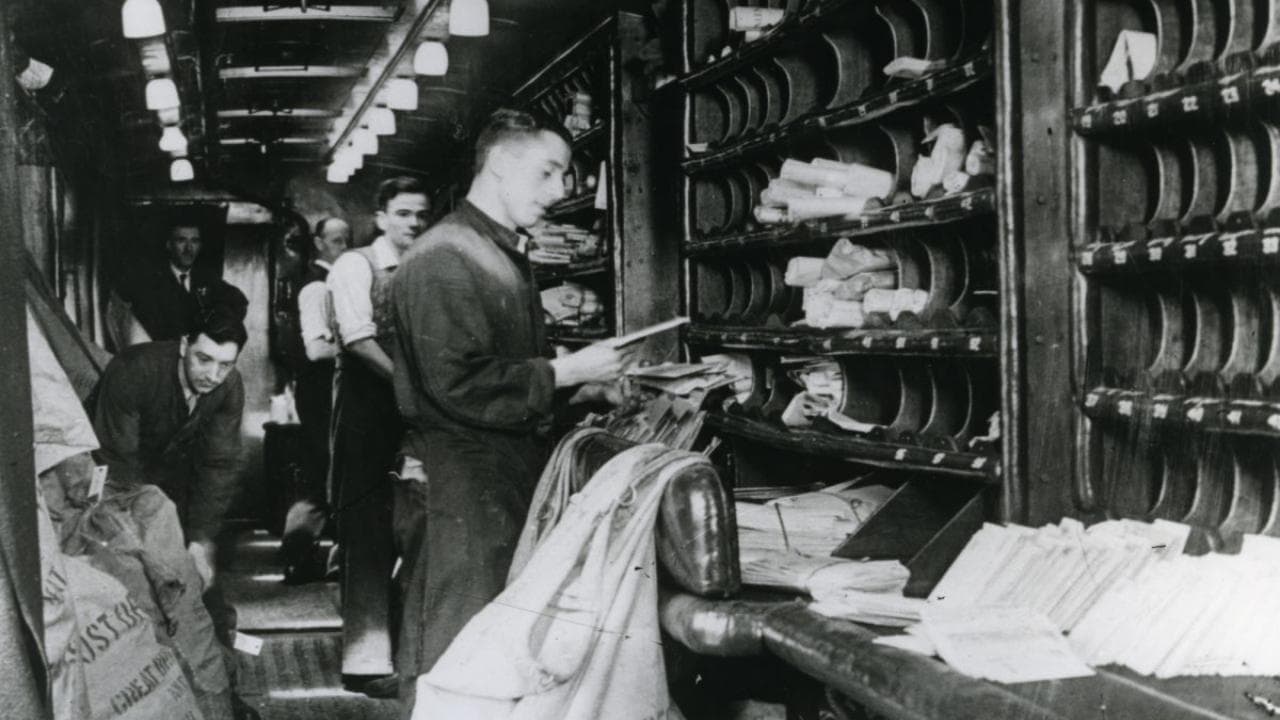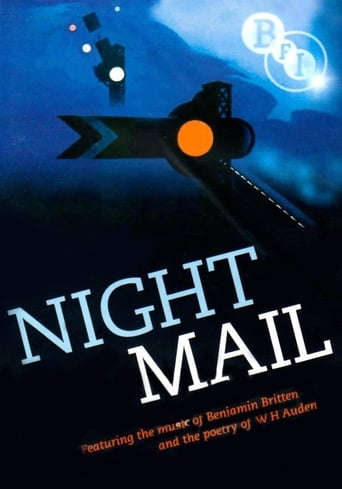

Very well executed
... View MoreThis is a must-see and one of the best documentaries - and films - of this year.
... View MoreWhile it is a pity that the story wasn't told with more visual finesse, this is trivial compared to our real-world problems. It takes a good movie to put that into perspective.
... View MoreGreat movie. Not sure what people expected but I found it highly entertaining.
... View More"Night Mail" is still a famous film 75 years after it was made in 1936. It is not, however, a feature film but a documentary, only 25 minutes long, about an everyday subject, the journey of the mail train from London to Scotland. It is perhaps the best-remembered of a series of films produced by the GPO Film Unit publicising the work of the British General Post Office.Part of the reason for its fame is the collaboration between two giants of the English cultural scene, the poet W. H. Auden and his friend the composer Benjamin Britten. Auden's poem written for the film, the one starting "This is the Night Mail crossing the border, Bringing the cheque and the postal order" has been much anthologised; I was introduced to it at primary school, and some of its evocative lines, such as "But a jug in the bedroom gently shakes" and "Letters with faces scrawled in the margin" have remained with me ever since. In the film itself the poem is read out in the closing few minutes, beginning slowly but picking up speed in order to imitate the rhythm of the train's wheels, and then slowing down again as the train approaches its final destination in Aberdeen. It is accompanied by Britten's music which also evokes the sounds and rhythms of a moving train.The film is, however, also notable for its purely visual qualities, with some striking black-and-white photography of the train and the landscapes, both rural and industrial, through which it passes. There are films where virtually every shot reminds us of a painting; here every shot reminds us of a documentary photograph, perhaps something from "National Geographic". The film also serves as a piece of social history, even if the obviously scripted dialogue between the men in the on-board sorting office owes more to upper-class preconceptions about how working-class Britons spoke than to reality. (These scenes were not shot on board the train itself but in a studio). We may today regard the steam locomotive as a quaint and cosy part of the nostalgia industry, and that system of nets used for loading and unloading mailbags while the train is in motion certainly has, to our eyes, a Heath-Robinson air about it. Nevertheless, in 1936 the Royal Mail had a well-deserved reputation for efficiency, and the film helps us to understand how it achieved this reputation with the aid of what would have been the state-of-the-art technology of the period.I haven't awarded the film a score out of ten, as it seems pointless trying to compare it with the full-length dramas which I normally review. A recent viewing on the "Sky Arts" channel, however, has enabled me to appreciate a much talked-about film which for me had for a long time just been a memory from a school poetry lesson.
... View MoreHere, courtesy of an excellent DVD from The British Film Institute, is the real-life counterpart of "The Flying Scot". Produced by John Grierson for the General Post Office Film Unit, brilliantly directed by Harry Watt and Basil Wright, "Night Mail" is a short account (25 minutes) of the special train literally a traveling post office that made a 365 nights-a-year journey from Euston station in London to Glasgow in Scotland in the 1930s and beyond. (The film was released by Associated British in 1936). With carriages staffed by the real mail sorters, it's impossible to separate the studio material from actuality. The only giveaways are the snatches of dialogue which have obviously been post-synced by professionals under the direction of Alberto Cavalcanti. True, in almost all cases, the directors have taken great care to cleverly obscure the mouths of the workers, but their accents are undoubtedly those of actors akin to the credited off-camera commentators, Stuart Legg and John Grierson himself.Many people have praised the Benjamin Britten score and the brief poem by W.H. Auden, but for me, the chief joys of the film lay in the cinematography by Chick Fowle and Jonah Jones. Just about the whole movie was shot at night as the train speeds through unusually bleak, blighted landscapes, which give this film a distinctive, noirish quality that is reinforced by the smelters, mills and smoke-stacks of Scotland's dismally sterile, impersonal and uninviting factory towns.
... View MoreIf you've ever studied film or Media in England you would have certainly come across the GPO Film Unit during your studies. A unit formed by John Grierson after being influenced by Robert Flaherty of 'Nanook of the North' fame!This documentary shows how the people of 1930's United Kingdom got there mail from a to b!Directed Basil Wright with commentary by John Grierson & Stuart Legg and superb and now famous poem finale by the now great W.H. Auden this is a good documentary.8/10
... View MoreThis film was made by the General Post Office (GPO) an organisation that has seen many manifestations and name changes since 1936. It depicts a near-utopian world populated by chirpy proletarians working through the night to sort and deliver the mail. The technology is ancient, steam trains, hand trolleys, manual sorting. Bags of unsorted letters are hung on the side of the railway line and caught by a mechanical grab as the train passes. Bags of sorted letters are similarly hung out of the train and caught in a net as it flashes by. The impression was given of extreme efficiency but I was struck by the lack of controls. If a bag missed the net, probably no-one ever noticed until it was found months later half-eaten in a field full of sheep along the railway line. The photography was excellent with lots of silhouettes against the night sky. The sound quality in the print I saw was poor but the dialogue given to the plucky workers was clunky anyway and largely not worth hearing. The voice giving the commentary had to be heard to be believed. My favourite character was the manager in a suit who wandered amiably down the train dispensing dubious advice. Some things never change. Night Mail is largely remembered today because of Benjamin Britten's and WH Auden's collaboration on the film but their contribution is limited to a brief section at the end.
... View More